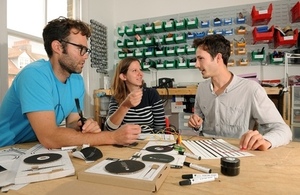Electro-conductive materials: switching people on to science
London-based start-up Bare Conductive make innovative electro-conductive materials that bring surfaces - and technology - to life.

The Bare Conductive team
Innovation comes in many guises. For Bibi Nelson, Matt Johnson, Isabel Lizardi and Becky Pilditch the journey began at the Royal College of Art with a joint project exploring the interactive possibilities of electrically conductive materials.
But there wasn’t a master plan - as Bibi Nelson recalls:
We did a talk about our project at a conference. Someone blogged and the online buzz led to a call from Sony who wanted us to do a viral ad campaign for singer Calvin Harris. One thing just led to another.
Holding on to the dream
They founded Bare Conductive in 2009. Its first product, Bare Paint, is a non toxic material that can be applied, like a paint, to everything from cement and wood to paper and textiles. On drying it becomes electrically conductive and can be used to trigger switches or activate sounds.
The enthusiasm of the launch faded in the face of challenges familiar to many start-ups - developing new products and setting up a viable business. Things hit a low in the Autumn 2010. Bare Conductive wanted to create non-toxic conductive ink to give people a safe way to engage with electronic circuits, but it needed funding to turn this idea into reality.
The Innovate 10 Launchpad competition - set up by Innovate UK to support small companies with disruptive technologies - helped Bare Conductive rediscover its creative spark. It entered the competition and won £100,000 in funding to progress its ideas.
It was the boost the company needed to keep going. But it wasn’t just the money, support from Innovate UK meant that suppliers and manufacturers were willing to work with a new start up.
Many markets
Bare Conductive now employs six people full time and two people part time at its Spitalfields workshop in East London.
The original Bare Paint in jars was followed by the Bare Paint Pen and by kits that guide customers to use the paints in projects such as electronic greeting cards or light-up paper houses.
60 per cent of sales are in the UK. Education accounts for 50 per cent of sales - with teachers using the kits and the materials as a fun and creative way of exploring science and technology with children. Around 40 per cent of sales are in the US where it sells online through its website and a network of 80 online resellers.
Bare Conductive is also pushing into the US retail marketplace, where it can point to a very big win. Retail giant Radio Shack followed an initial order for 14,000 pens with another for several thousand kits to sell in its concept stores in New York.
Staying creative
Bare Conductive continues to develop and adapt its products to engage customers of all ages with electronics and technology.
The latest kit is a DJ set that allows the customers to create different sounds by painting a paper disc. It’s also developing materials that can be used in interactive print processes which have potential applications in packaging and print advertising. Architectural applications like light switches or even home sensors are also being investigated.
The team has only good things to say about Innovate UK. Matt Johnson adds
They’re such an easy partner to work with - open and really non-bureaucratic - crucial when you’re trying to develop new technologies.
Find out more about Innovate UK Launchpads
Find out more about Innovate UK support for the digital economy